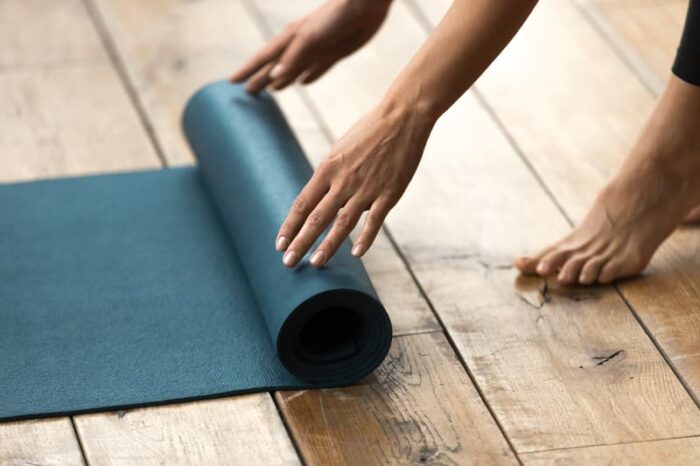- Calls to this hotline are currently being directed to Within Health, Fay or Eating Disorder Solutions
- Representatives are standing by 24/7 to help answer your questions
- All calls are confidential and HIPAA compliant
- There is no obligation or cost to call
- Eating Disorder Hope does not receive any commissions or fees dependent upon which provider you select
- Additional treatment providers are located on our directory or samhsa.gov
Physical Activity Attitudes and Beliefs Among Women with Eating Disorders

Physical activity is promoted by healthcare professionals and media alike as a way of improving mental and physical health. However, when suffering from an eating disorder the use of physical activity may worsen mental and physical health. Its been determined that between 30-80% of individuals suffering from eating disorders take part in excessive amounts of physical activity [1].
Common Belief #1: Physical Activity can only Benefit my Health
The addition of exercise usually starts as a well-meaning decision to improve health.
The belief that more is better can blind us from the damage physical activity is causing the body.
Abuse of movement, especially when it is paired with undernourishing the body, will negatively impact health. Educating on what happens when physical activity is abused can help patients understand why they need to challenge their beliefs around exercise.
No matter the type of exercise, the body needs fuel or food to move. If the body is restricted, it will start taking energy from itself. This can include fat stores, muscles, and eventually organ tissue and bone mass. When depriving the body of nourishment, complications such as bradycardia, hypotension, anemia, hormonal imbalance, and low bone mass arise [1].
Patients often believe that physical activity is the lesser of evils when compared to other behaviors, such as binging, purging, and restricting. As we can see, abuse of physical activity can lead to irreversible health complications.
Common Belief #2: Physical Activity Improves the Way I Feel, So How Can it be Bad?
For some patients, physical activity is believed to be the answer to their problems. When they increase, exercise their anxiety, stress, and depression decrease [1]. They feel a sense of relief and accomplishment in controlling their body and emotions. Many often think exercise is the only answer to managing their negative emotions.
Others may struggle with compulsive thoughts to exercise. They may rely on movement to not only cope with emotions but silence thoughts around body image struggles and the amount of food they ate that day. Some feel more comfortable eating because they know physical activity burned calories or compensated for what they ate earlier in the day [1].
For many, there is a belief that without physical activity, their urges to binge, purge, or restrict food would increase [1]. Again, giving a false reality that exercise is the answer to controlling their body. In reality, exercise is only acting as a Band-Aid to cover up a much deeper-rooted problem.

Common Belief #3: I Will Lose my Identity without Physical Activity
Many grow up with physical activity ingrained in their identity as an athlete. Some identify with physical activity being a way of life and experiencing discomfort if they do not move their body.
When the word discomfort is used, it often raises a red flag; what does this mean? Discomfort may refer to fear or anxiety. Some may fear “if I don’t move my body, I’m going to gain weight” or “who am I if I’m not an athlete?” Other common fears are that of judgment, “if I do not move, I will be perceived as lazy or unproductive” or “if I do not look like an athlete, then how can I identify as one?”
Approaching the fears, anxieties, and judgments connected with removing or decreasing physical activity is an essential part of recovery. This is especially true if treatment is recommending abstaining from physical activity while restoring weight, including fat, muscle, organ, and bone mass.
A patient who identifies strongly with physical activity can be devastated by the recommendation to rest and recover without movement. Educating on the recovery process and appropriateness of physical activity can help patients to understand the goal of repairing their relationship with their body, mind, and food. Eventually, showing how to shift focus from how I look towards the experience of having a body that is well functioning [2].
Common Belief #4: Physical Activity Should be a part of the Recovery Process
At the start of eating disorder treatment, most healthcare professionals will recommend abstaining from physical activity during the process of restoring weight. This is going against patient’s beliefs that physical activity is needed to control their emotions and prevent weight gain.
Education during treatment must support learning skills to cope with discomfort and negative emotions outside of physical activity. There needs to be an explanation around how exercise may be getting in the way of living the lifestyle they truly desire.
It is important to name that physical activity is not inherently bad, but the relationship with their body needs mending before movements can be used productively. If patients do not achieve significant progress before incorporating exercise this could result in the maintenance of obsessive-compulsive aspects of eating disorders [1].
Exercise can be a productive part of treatment once a patient’s vitals and weight are stable. At the same time, a patient must be appropriately nourishing their body prior to and while exercise is incorporated. To intuitively connect to physical activity, it is encouraged to start with mindful forms of movement. This can include yoga, stretching, and walking. These forms of movement support a patient in exploring how they feel and experience their body.
In the end, the goal is to encourage hearing and listening to the body. Understanding the importance of meeting your needs through nourishment and then finding enjoyment in moving the body. When in recovery, the brain can set back into old routines [2] or habits quickly. To support recovery, make sure to check in and ask what is motivating me to be physically active?
References:
[1] Brunet, J., Del Duchetto, F., & Wurz, A. (2021). Physical activity behaviors and attitudes among women with an eating disorder: a qualitative study. Journal of Eating Disorders, 9(1). https://doi.org/10.1186/s40337-021-00377-w [2] Pettersen, G., Sørdal, S., Rosenvinge, J. H., Skomakerstuen, T., Mathisen, T. F., & Sundgot-Borgen, J. (2017). How do women with eating disorders experience a new treatment combining guided physical exercise and dietary therapy? An interview study of women participating in a randomised controlled trial at the Norwegian School of Sport Sciences. BMJ Open, 7(12), e018588. https://doi.org/10.1136/bmjopen-2017-018588About the Author:
 Raylene Hungate, RD/N, LD/N is a registered dietitian dedicated to providing the utmost care and support to those struggling with mental health. As a supporter of the Health at Every Size movement and the idea that all foods fit, she is passionate about helping others explore a life full of nourishment and bursting with flavor.
Raylene Hungate, RD/N, LD/N is a registered dietitian dedicated to providing the utmost care and support to those struggling with mental health. As a supporter of the Health at Every Size movement and the idea that all foods fit, she is passionate about helping others explore a life full of nourishment and bursting with flavor.
As an eating disorder dietitian, Raylene works not only in Private Practice, but also as a dietitian for an eating disorder treatment center in Los Angeles, California. She finds great joy in guiding others through an empowering journey of self-discovery and healing.
The opinions and views of our guest contributors are shared to provide a broad perspective on eating disorders. These are not necessarily the views of Eating Disorder Hope, but an effort to offer a discussion of various issues by different concerned individuals.
We at Eating Disorder Hope understand that eating disorders result from a combination of environmental and genetic factors. If you or a loved one are suffering from an eating disorder, please know that there is hope for you, and seek immediate professional help.
Published June 8, 2021 on EatingDisorderHope.com
Reviewed & Approved on June 8, 2021, by Jacquelyn Ekern MS, LPC

The EatingDisorderHope.com editorial team comprises experienced writers, editors, and medical reviewers specializing in eating disorders, treatment, and mental and behavioral health.

